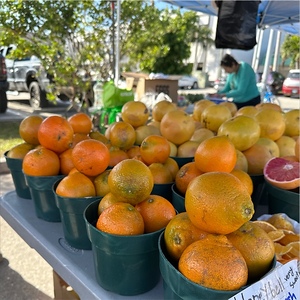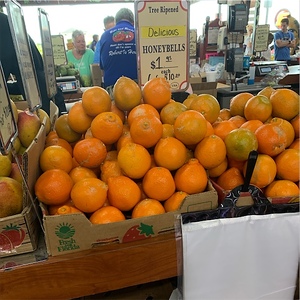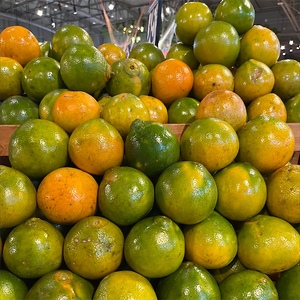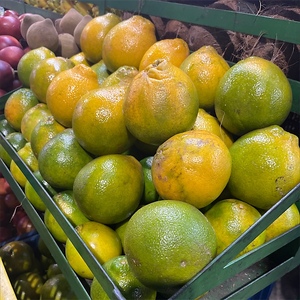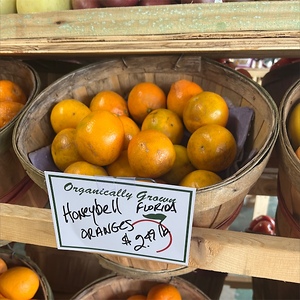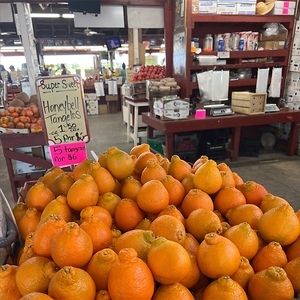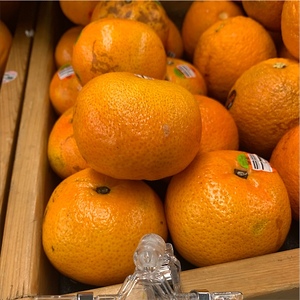

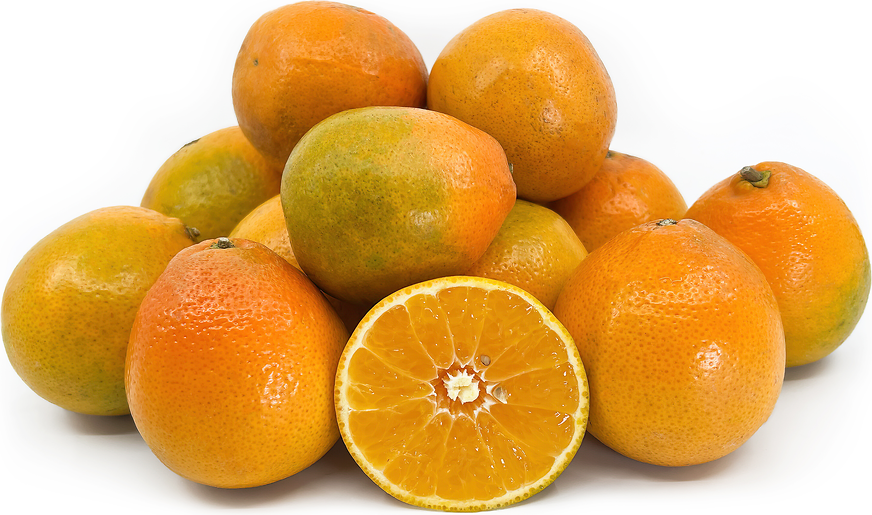
Honeybell Tangelos
Estimated Inventory, lb : 0
Description/Taste
Honeybell tangelos are a medium to large varietal, averaging 7 to 10 centimeters in diameter, and have a round to oval shape with a slightly elongated neck and prominent bump on the stem end. The fruit’s skin is smooth, glossy, taut, and moderately adhered, covered in noticeable oil glands, giving the surface a pebbled consistency. The finely pitted skin is also thin, making the fruit easy to peel, and showcases a vibrant red-orange hue. Underneath the surface, the orange flesh is tender, succulent, soft, and aqueous with a melting consistency. The flesh is also divided into 10 to 12 segments by thin, barely noticeable membranes and is either found seedless or contains a few tiny ivory seeds. Honeybell tangelos should feel heavy for their size when ripe and are extremely delicate, being easily damaged or torn with handling. The variety is edible raw and releases a fragrant aroma when peeled. Honeybell tangelos are known for their rich, sweet, tart, and tangy flavor with floral, fruity, and honeyed nuances.
Seasons/Availability
Honeybell tangelos are only available for a short season in the late winter, with a peak season in Florida from January to early February.
Current Facts
Honeybell tangelos, botanically a part of the Citrus genus, are a specialty fruit belonging to the Rutaceae family. The hybrid was developed from a cross between a tangerine and a grapefruit and was released from an Orlando agricultural research station in 1931. Honeybell tangelos are also known as Minneola tangelos and are a unique variety favored for their large size and shape, juicy, succulent flesh, and sweet-tart taste. When the cultivar was first released, the public was unsure of its unusual bell shape and characteristic protrusion on one end, as it differed from the other citrus they were familiar with. This bump gives the fruits their “bell” moniker, as the protrusion is shaped like an upside-down bell. Despite the initial wariness, consumers began sampling Honeybell tangelos and became enamored with their honey-sweet and tangy flavor. Honeybell tangelos quickly became a desired cultivar, but the variety is challenging to grow, limiting their availability. The variety is also sensitive to frost damage, leading to it only being cultivated in a few regions of the United States. Each year, Honeybell tangelos are pre-sold before the fruits are harvested. The tangelos must be hand-cut from the tree to avoid tearing their thin skin, and the entire season typically spans a few weeks to a month. The fruits are also packed in specialized trays like eggs to protect their fragile nature. Honeybell tangelos are often regarded as one of the most challenging citrus varieties in the United States, and the fruits are primarily eaten fresh to savor their authentic texture, flavor, and aroma.
Nutritional Value
Honeybell tangelos are a source of vitamin C to strengthen the immune system, potassium to balance fluid levels within the body, fiber to regulate the digestive tract, and calcium to protect bones and teeth. The variety also provides vitamin A to maintain healthy organs, iron to develop the protein hemoglobin for oxygen transport through the bloodstream, magnesium to control nerve functions, and other nutrients, including B vitamins, folate, phosphorus, riboflavin, and thiamin.
Applications
Honeybell tangelos have a sweet and tangy flavor suited for raw preparations. The variety is popularly consumed out of hand to savor the flesh’s soft, tender, and aqueous consistency. Honeybell tangelos are easy to peel and are prepped by hand to enjoy as a refreshing snack. The fruits can also be segmented and served on fruit platters or charcuterie boards, tossed into salads, or chopped into salsa. Try dipping Honeybell tangelo segments in chocolate as a dessert or adding them to herb-filled side dishes and slaws. The variety is also pressed into juice and infused into sauces, dressings, oils, and vinaigrettes. Two medium-sized Honeybell tangelos are said to produce around half a glass to a full glass of juice, making them one of the most aqueous commercial varieties. The juice can also be blended into smoothies, mixed into punches, cocktails, and sparkling beverages, or frozen into popsicles and sorbet. While less common, Honeybell tangelos can be utilized in cooked preparations. The fruits can be simmered into jams, jellies, and marmalades or incorporated into cakes, cookies, muffins, brownies, or scones. One medium-sized Honeybell produces around four teaspoons of zest. This zest can be sprinkled over meat dishes, grain bowls, or seafood for enhanced flavoring. It can also be added to pasta along with fruit segments as a fresh twist. Honeybell tangelos pair well with herbs such as mint, parsley, and cilantro, aromatics including ginger, onions, garlic, and scallions, meats such as poultry, pork, and beef, seafood including fish, crab, and shrimp, tofu, and nuts such as almonds, peanuts, pine, and walnuts. Whole, unwashed tangelos will keep for 4 to 7 days at room temperature in a cool, dry, and dark place and for 1 to 2 weeks when stored in the refrigerator.
Ethnic/Cultural Info
Honeybell is a marketing name given to Minneola tangelos grown in a specific, small region along the Indian River in Florida. Indian River County was established in 1925, and citrus was planted in the area roughly around the same time. Within the county, citrus, including Honeybell tangelos, are grown in the Indian River Citrus District, a region known for its unique terroir. The district’s subtropical climate and mineral-rich soil contribute to the fruit’s large size, tender nature, and juicy flesh. It is said the soil has a distinct layer known as the Anatasia formation, meaning it contains a mixture of coquina rock or a composite of rock and seashells. This soil type contributes vital vitamins and minerals to the citrus trees, especially calcium, helping to nurture and produce larger tangelos. The region's location beside the salty Atlantic Ocean is rumored to also add to the fruit’s rich taste. In the 1930s and 40s, Indian River Citrus became so well known for its citrus that other regions of Florida began labeling their citrus as grown in Indian River to increase sales. This angered the true Indian River Citrus growers, eventually presenting the issue to the Federal Trade Commission or FTC. The FTC granted the region protection over this labeling, and growers outside the region could no longer use the location to sell their fruits. Even in the modern day, only fruits grown in the Indian River Citrus region can be sold under this name. A group called the Indian River Citrus League was also formed to help protect the regional growers.
Geography/History
Honeybell tangelos are native to the United States and were developed through the United States Department of Agriculture, also known as the USDA, at their research station in Orlando, Florida. The hybrid variety was bred from a cross between Dancy tangerines and Duncan grapefruits and was the product of a study conducted by scientists at the research station focusing on fruit hybridization. It is unknown who the breeders were of this variety, but some sources mention that Frank Savage, Walter Swingle, and Thomas Robinson may have been involved. Honeybell tangelos were commercially released in 1931 and were one of the research station's most successful introductions. Since their debut, Honeybell tangelos have remained a specialty crop that is only grown in limited quantities. The variety is notoriously challenging to cultivate and only thrives in select climates. Fruits sold under the Honeybell name are grown along the eastern banks of the Indian River in Florida and are typically pre-sold through retailers, distributors, and growers. The variety is also planted in California and Texas, where it is marketed under the name Minneola. Outside of the United States, the hybrid variety is cultivated in Peru, Israel, Turkey, and South Africa.
Recipe Ideas
Recipes that include Honeybell Tangelos. One



